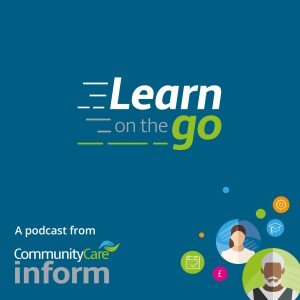
Motivational interviewing 2: improvised scenarios showing an MI approach in action
 2018-06-21
2018-06-21
Download
Right click and do "save link as"
Welcome to Learn on the go, a Community Care Inform podcast where we discuss what the latest research, practice models and policy guidance mean to your practice.
In this episode – the second of two on motivational interviewing – our expert guests improvise two scenarios; one showing a non-MI approach, the other showing MI in action. They then talk about the 'nuts and bolts' of motivational interviewing.
The experts
Lydia Guthrie
Co-director of training organisation Change Point Learning and Development, and a qualified social worker who has worked in the probation service and in the voluntary sector.
David Wilkins
Social work lecturer at the University of Cardiff, with previous roles including principal child and family social worker for the London borough of Enfield.
01:25 - 06:32 on the podcast
In this scenario, David and Lydia give a demonstration of how not to have a conversation with someone who might need help. David plays the part of a manager and Lydia plays the part of a social worker who is struggling to keep up-to-date with the work she has been allocated.
06:35 - 32:58 on the podcast
In this scenario, Lydia and David give an example of using some motivational interviewing skills in a social work context. Lydia is playing the role of a social worker, while David plays a father. The father in this situation has contact with his children every weekend, they come and stay at his house, and one of the issues of concern is that he’s regularly using cannabis when the children are in his company. It’s agreed by both the worker and the dad and everybody else involved in supporting this family that this is an appropriate goal for him to work on changing.
33:05 - end of podcast
Four of the key nuts and bolts of the motivational interviewing approach are known by the OARS acronym. Lydia goes through what these are and how to use them in practice.
If you’re a Community Care Inform subscriber, you can access supporting materials for the podcast, including a written transcription, the key points covered in the episode, and learning activities you can do by yourself or in a group. Just go on the Inform Children or Inform Adults site and search for ‘podcast’.
view more
More Episodes
Care Quality Commission assessments
 2023-09-11
2023-09-11
 2023-09-11
2023-09-11
Campaign podcast with Luke Rodgers
 2023-08-29
2023-08-29
 2023-08-29
2023-08-29
Learn on the go: personality disorder
 2023-02-20
2023-02-20
 2023-02-20
2023-02-20
Restorative practice
 2022-07-26
2022-07-26
 2022-07-26
2022-07-26
Homelessness and safeguarding
 2022-05-25
2022-05-25
 2022-05-25
2022-05-25
Attachment-based trauma
 2022-02-09
2022-02-09
 2022-02-09
2022-02-09
Sibling sexual abuse
 2021-07-13
2021-07-13
 2021-07-13
2021-07-13
Supporting social workers in 2021
 2021-03-15
2021-03-15
 2021-03-15
2021-03-15
Anti-racist social work practice
 2020-07-09
2020-07-09
 2020-07-09
2020-07-09
012345678910111213141516171819
Create your
podcast in
minutes
- Full-featured podcast site
- Unlimited storage and bandwidth
- Comprehensive podcast stats
- Distribute to Apple Podcasts, Spotify, and more
- Make money with your podcast
It is Free
- Privacy Policy
- Cookie Policy
- Terms of Use
- Consent Preferences
- Copyright © 2015-2024 Podbean.com





